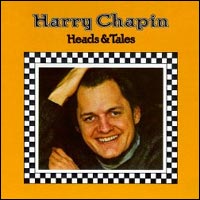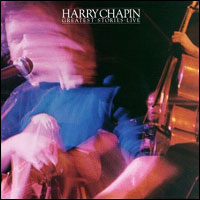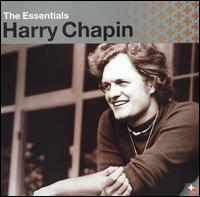|
Music Reviews
Alternative
Blues
Books
Christmas
Classic Rock
Country
Jazz
Lounge
Oldies
Power Pop
Punk & New Wave
Reggae
Rhythm & Blues
Seventies
Texas
Special Features
Randy's Rodeo
Sex Pistols
Motown
Halloween
Valentine's Day
Information
About Me
Feedback
Links
User's Guide
Support Me
Amazon
iTunes
Sheet Music Plus
|
Sock it to me, Santa! Visit my other website, www.hipchristmas.com Visit my other website, www.hipchristmas.com
 I
was very close to Harry Chapin. And Harry and I just agreed that we didn't agree
about the quality of his music. And I miss him. He was a really good friend. -
Dave Marsh I
was very close to Harry Chapin. And Harry and I just agreed that we didn't agree
about the quality of his music. And I miss him. He was a really good friend. -
Dave Marsh
Let me preface the following review with an earnest disclaimer. Unlike music critic
Marsh, I most certainly was not acquainted with Harry
Chapin, but I admire him wholeheartedly. Possessed of a golden soul, Chapin strove
his entire life to touch people - both with his music and with his good works. The
lives of those people - and the world at large - are generally better for it. Chapin's
amiable persona earned him a loyal following, and he was a generous activist, working
primarily to alleviate world hunger before his tragic death in 1981. Sadly, though,
good intentions and good works don't necessarily make for good art and - here's where
the disclaimer comes in - musically speaking, Harry Chapin could be a boring old
fart and a pompous windbag.
Now, as a teenager, I heard and appreciated Harry's records on the radio. "Taxi" (1972)
was Chapin's greatest hit, and it was one of the very first songs I remember hearing
on the Top 40 radio that dominated the airwaves at the time. Later songs like "Cats
In The Cradle" and "W.O.L.D." told fascinating stories with a simple
life-lessons, and they stood in stark contrast to the scratch-the-surface zeitgeist of
the decade. When I purchased his Anthology LP
(1985, never released on CD), I came to appreciate how effectively he could spin
a yarn, even if the appeal of his songs often lay in bald emotional blackmail.
 More
than a decade after Chapin's passing, I bought The
Gold Medal Collection (a 2-CD collection), and I came to understand why critics
like Marsh found Harry's music ponderous and tiresome. With greater scrutiny, I
realized how fond Chapin was of overly-orchestrated, stylistically-confused, symphony-length
story songs that drew some sort of tortured moral out of everyday life. Played
well, this approach could be charming and bittersweet (as in "Taxi").
Other times, it bordered on oppressive, leaving listeners with the nagging sensation
that their feelings have just been played like a cheap fiddle (c.f. "A Better
Place To Be"). And, at other times (such as his "Taxi" sequel),
Chapin somehow managed both tricks - albeit within the span of a nearly ten-minute
song... When all was said and done, I came to think of Harry Chapin as one of the
kooky, well-meaning artists who made the Seventies so much fun. His fans, however,
see him as a saint. More
than a decade after Chapin's passing, I bought The
Gold Medal Collection (a 2-CD collection), and I came to understand why critics
like Marsh found Harry's music ponderous and tiresome. With greater scrutiny, I
realized how fond Chapin was of overly-orchestrated, stylistically-confused, symphony-length
story songs that drew some sort of tortured moral out of everyday life. Played
well, this approach could be charming and bittersweet (as in "Taxi").
Other times, it bordered on oppressive, leaving listeners with the nagging sensation
that their feelings have just been played like a cheap fiddle (c.f. "A Better
Place To Be"). And, at other times (such as his "Taxi" sequel),
Chapin somehow managed both tricks - albeit within the span of a nearly ten-minute
song... When all was said and done, I came to think of Harry Chapin as one of the
kooky, well-meaning artists who made the Seventies so much fun. His fans, however,
see him as a saint.
And a saint he was - just not a very musically disciplined one. Harry Chapin fought
to end human suffering and protect human dignity, and it's no surprise that his
work has continued on into the present day through his foundation (learn
more), nor that his music continues to win converts and inspire activists.
I doubt Chapin had a malicious bone in his body, and his sense of humor was immense,
allowing him to laugh freely at himself and the crazy world around him. On record,
Harry comes across as the sort of guy who could turn an evening at the corner bar
into a transformational experience, full of great stories and convivial good cheer.
And I'm sure this is the conundrum Marsh faced. Here was a prince of a man, an
incredibly sweet, giving man, who wrote lyrics like Rod McKuen on speed and music
like Anthony Newley on acid.
 So,
if you take my side in the debate, Chapin's music is best taken in small doses.
Rhino Records' 3-CD Story
Of A Life: The Harry Chapin Box, then, would not be my recommendation. Spanning
Harry's entire career (including an early cut with brother Tom), the box collects
nearly 50 cuts of hits and album tracks, plus copious annotation from Harry's family
and peers. Nevertheless, this is too much Harry for me, and even the briefer Gold
Medal Collection taxes my patience (and it substitutes alternate versions of
several popular songs, including "Cats In The Cradle"). Harry's fans,
though, will want all this and more. Happily for them, most of Chapin's original
Elektra albums are still in print, with the early ones like Heads & Tales (1972), Sniper & Other
Love Songs (1972), and Verities & Balderdash (1974)
holding up best. For me, then, The
Essentials, Rhino's one-disc follow-up to their expansive box, is perfect -
a perfunctory recitation of Chapin's hits with a minimum of his hot air. So,
if you take my side in the debate, Chapin's music is best taken in small doses.
Rhino Records' 3-CD Story
Of A Life: The Harry Chapin Box, then, would not be my recommendation. Spanning
Harry's entire career (including an early cut with brother Tom), the box collects
nearly 50 cuts of hits and album tracks, plus copious annotation from Harry's family
and peers. Nevertheless, this is too much Harry for me, and even the briefer Gold
Medal Collection taxes my patience (and it substitutes alternate versions of
several popular songs, including "Cats In The Cradle"). Harry's fans,
though, will want all this and more. Happily for them, most of Chapin's original
Elektra albums are still in print, with the early ones like Heads & Tales (1972), Sniper & Other
Love Songs (1972), and Verities & Balderdash (1974)
holding up best. For me, then, The
Essentials, Rhino's one-disc follow-up to their expansive box, is perfect -
a perfunctory recitation of Chapin's hits with a minimum of his hot air.
Simply put, the official critical line on Harry Chapin is that he didn't know
when to shut up. But, it warrants mention that Chapin earned most of his fans not
through radio play but in person during his warm, affable, lengthy concerts. Greatest
Stories Live (1976), then, could be considered the truly "essential" Harry
Chapin. Given the opportunity to spread his ambitious arrangements and meandering
yarns over two LP's, Chapin shone. Even if his loyal fans were to acknowledge Chapin's
frequently taxing pomposity, I'm sure they would say that his generous heart just
couldn't contain all that love. I suspect the truth is somewhere in between, and
that's a truism Chapin always maintained in his musical morality plays. Without
a doubt, the world is poorer place without Harry Chapin in it, and years after
his death his circle continues to expand. [top of page]
 Selected Harry
Chapin Albums Selected Harry
Chapin Albums
[top of page]
 Essential Harry
Chapin Songs Essential Harry
Chapin Songs
- Better Place To Be (1972)
- Cat's In The Cradle (1974)
- Circle (1972)
- Could You Put Your Light On, Please (1972)
- I Wanna Learn A Love Song (1974)
- Sequel (1980)
- Taxi (1972)
- 30,000 Pounds Of Bananas (live version, 1976)
- W.O.L.D (1973)
[top of page]
 The Harry
Chapin Bookshelf The Harry
Chapin Bookshelf
[top of page]
 Harry
Chapin On The Web Harry
Chapin On The Web
[top of page]
 Feedback Feedback
Your witty comments, impertinent questions, helpful suggestions, and angry denials
are altogether encouraged. Submit feedback via email;
submissions will be edited and posted at my discretion.
December 22, 2002. I just found your website from a search
of Harry Chapin, and I believe you missed the mark on his contribution to the music
I grew up on (average white male born in 1959). Point out one other musician who gave
even half of the concerts to feed another person! His music had depth and clarity that
isn't matched today. Give Harry a break and listen a little harder to the music. There
is a lesson there for all of us! - name withheld
Randy Responds. Contritely, I revised and expanded this
page after I received the above email. Admittedly, my original entry was more than
a tad flip in its tone. While I make no apologies for what I feel is the true nature
of Chapin's music, my revision is a more measured, detailed explanation of Harry and
his contribution to music and the world at large.
|
|